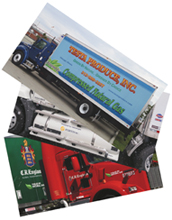Some produce companies may eventually harvest their own biological material, such as vegetable or other waste to create renewable natural gas, notes John Boesel, president and chief executive officer of Calstart, a Pasadena, CA group dedicated to ‘clean’ or more environmentallyfriendly transportation options. This type of fuel could be used in a hybrid vehicle for even greater savings, he adds.
With natural gas production increasing and prices staying low, the concept is gaining traction among alternative fuels. Maintenance is simpler than with diesel vehicles, the trucks perform as well, and natural gas can provide a quieter, more pleasant work environment for drivers.
“Natural gas is a cleaner product, with lower particulates, and on a total cost of ownership basis, it is cheaper,” says Boesel, adding, “it is something the produce industry ought to take a serious look at.” Diesel exhaust can include soot and aerosols such as ash particulates, metallic abrasion particles, sulfates, and silicates—all of which can contribute to air pollution levels.
Fuel particulates are a big concern at loading docks, especially with organic produce. “The emissions in loading and unloading areas will be lower, thus creating a better environment,” Boesel contends. Further, if produce is delivered in an eco-friendly truck, it is more in line with the values associated with organic and locally-grown products.
Benefits
Cleaner air, reduced greenhouse gases, and displacing foreign oil are all major benefits from using natural gas on the national level, says Rich Kolodziej, president of NGVAmerica (Natural Gas Vehicles for America), a national trade organization located in Washington DC, dedicated to the use of alternatively-fueled vehicles.
While fleet operators appreciate these attributes, it comes down to “economics, economics, economics,” according to Kolodziej. “If you’re going to pay off the incremental cost of your vehicle in less than two to three years, and then get a positive economic advantage with the fuel, that’s significant,” he notes.
For those without their own trucks that rely on brokers and logistics firms, every dollar saved can increase already thin profit margins. “These companies are in the food business; they are not in the trucking business,” Kolodziej notes. “Trucking is an expense, and if they can shave that expense, it’s going to go right to the bottom line.”
With natural gas taking center stage in the alternative fuel universe, transporters’ enthusiasm for other vehicles, such as hybrids, has waned.



